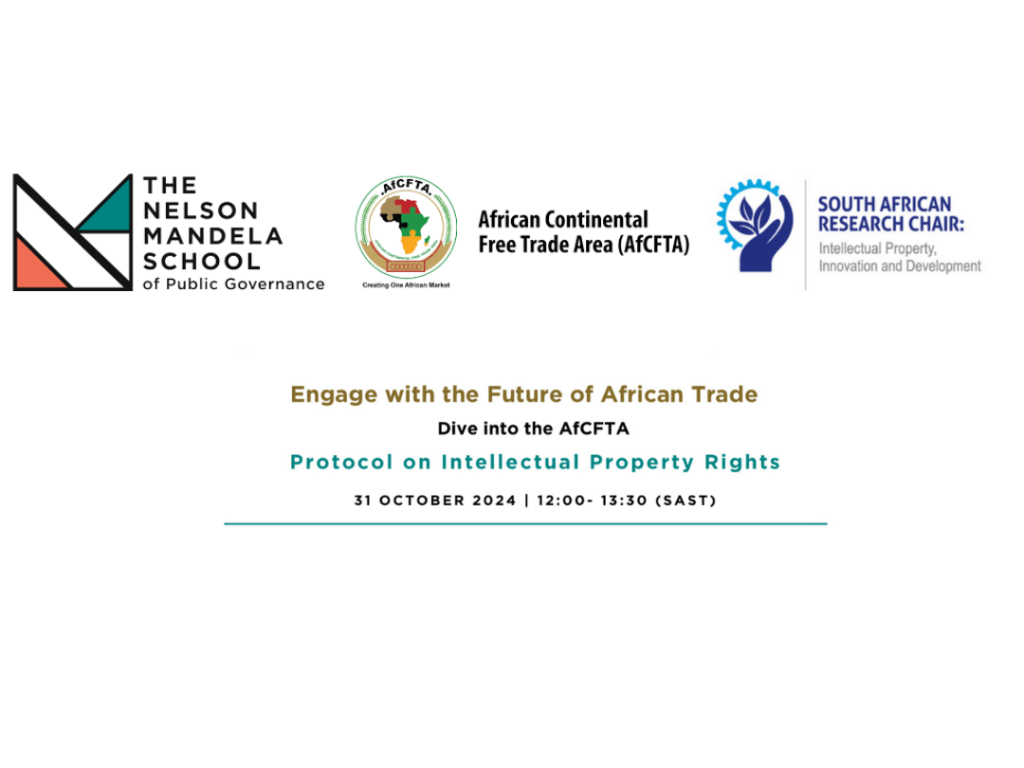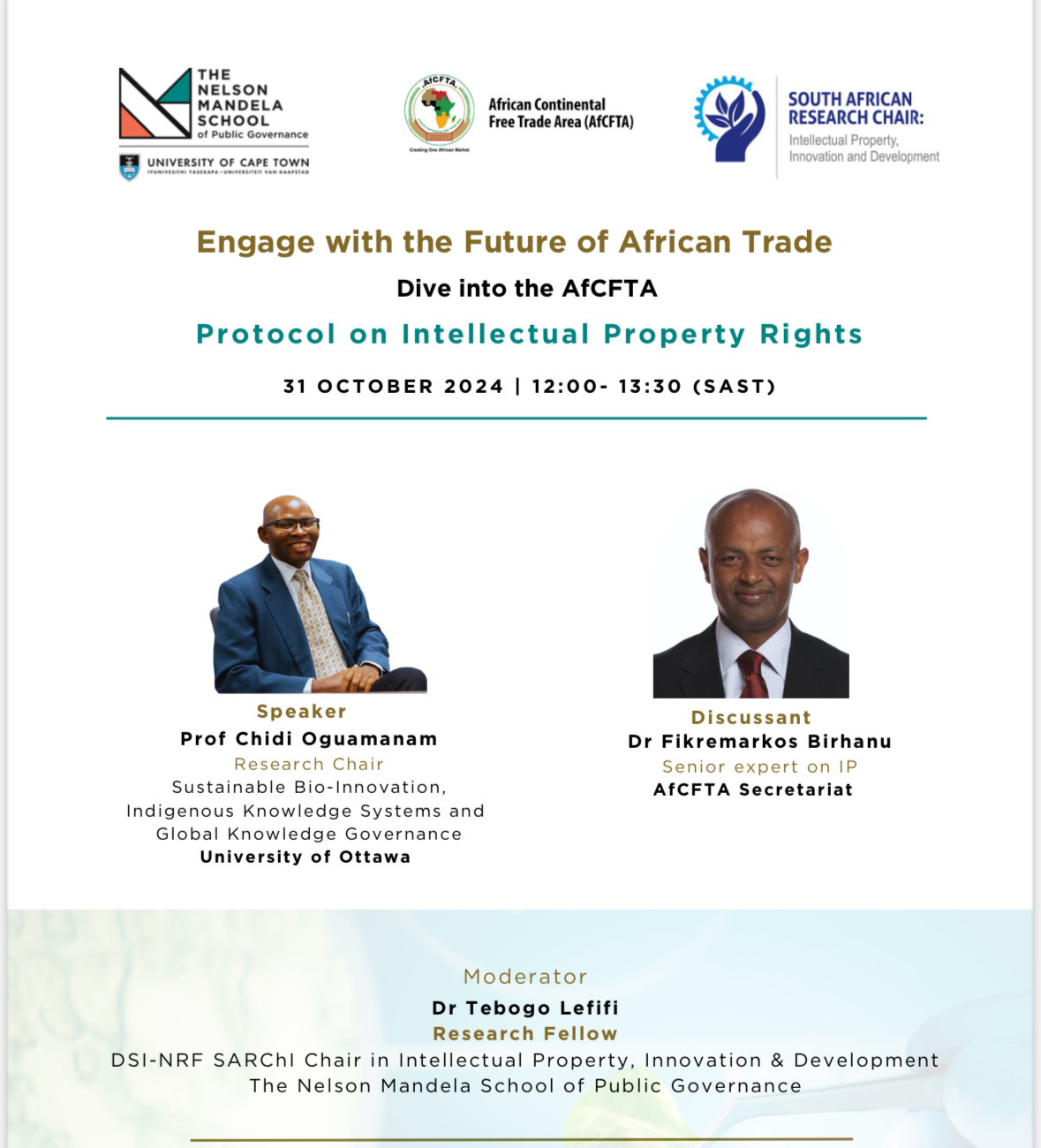Webinar on the AfCFTA IP Protocol

On the 31st of October, the Nelson Mandela School of Public Governance and the South African Research Chair: Intellectual Property, Innovation and Development, held a brown bag webinar on the African Continental Free Trade Agreement (AfCFTA) Protocol on Intellectual Property Rights. The event brought two leading intellectual property law (IP) experts, Professor Chidi Oguamanam as the main speaker and Dr. Fikremarkos Birhanu as discussant. Professor Oguamanam holds the Research Chair in Bio-Innovation, Indigenous Knowledge Systems and Global Knowledge Governance at the University of Ottawa, Canada and Dr. Birhanu is a Senior Expert on Intellectual Property at the AfCFTA Secretariat.
Professor Oguamanam delivered a presentation titled ‘Traditional Knowledge, Traditional Cultural Expressions and Genetic Resources – Unravelling A Global and Regional Regulatory Conundrum’. He shared on the economic significance of traditional knowledge (TK), traditional cultural expressions (TCE) and genetic resources (GR), the complexities in navigating the relationship between TK, TCE and GR with respect to IP, the global and regional developments that have paved the way for the AfFCTA IP Protocol and opportunities for the AfCFTA IP Protocol to plug gaps and fix critical issues. Professor Oguamanam began by emphasising TK, TCE and GR as Africa’s prime factor endowment of inestimable value. He provided a holistic outlook of TK and how the AfCFTA IP Protocol adopts a vast approach to IP by expanding the categories of IP to those that were considered to be on the periphery of IP, such as TK. He further highlighted the many global legal regimes that speak to Indigenous and Local Communities, described as regime complexes due various challenges surrounding them. He delved into the regional trends in Africa’s two regional IP organisations - OAPI and ARIPO - underscoring the holistic approach to protection of TK, TCE and GR in ARIPO and the trifurcated approach in OAPI. Professor Oguamanam also presented some national approaches, by highlighting some countries that have enacted legislation on TK, TCE and GR. Professor Oguamanam outlined the similarities between OAPI and ARIPO instruments in the purpose and scope of protection, the beneficiaries and transboundary issues, and how all that ties into the AfCFTA IP Protocol. He emphasised the IP/Trade-Related approaches to TK, TCE and GR, outlining the significance of the AfCFTA IP Protocol in promoting Africa-driven innovation, policy coherence and harmonisation of principles, prioritising African development aspirations and deepening IP culture and cooperation on IP enforcement. In conclusion he identified how TK, TCE and GR could be harnessed for trade purposes, to the extent that they are amenable to trade and commercial exploitation. He highlighted opportunities for plugging gaps through the involvement of Indigenous and Local Communities and the role of the State and national authorities.
Dr. Birhanu provided a brief background of the AfCFTA IP Protocol, highlighting that it must be considered within the context of a free trade area, where the Protocol is a tool to promote intra-African trade and support African regional integration. He indicated that the harmonisation of rules, policies, and institutions as prescribed in the Protocol is in pursuance of the overall objective of promoting trade. He further noted that the Protocol provides substantive rules and that details will be addressed in the annexes, with fairly detailed provisions on issues such cooperation, enforcement and institutional matters. He highlighted the disclosure requirement in access and benefit sharing, emphasising the need to have a balance to ensure appropriate disclosure and at the same time ensuring the process is not too cumbersome such as to become an additional obstacle. He underscored the need to create an enabling environment for the exploitation and use of TK, TCE and GR, and the critical importance of databases containing information on TK, TCE and GR. Dr. Birhanu outlined the transboundary issues related to TK, TCE and GR, which are especially critical in the context of Africa where TK, TCE, and GR are shared by multiple countries. He noted that in the absence of clear rules transboundary cooperation cannot take place, therefore the AfCFTA IP Protocol has provided guidance on this matter.
Professor Chidi Oguamanam and Dr. Fikremarkos Birhanu provided a rich discussion on a matter of critical importance to Africa as the continent navigates trade under the AfCFTA. The discussion was moderated by Dr. Tebogo Lefifi, a Junior Research Fellow of the Chair and Senior Programme Manager: Stakeholder Relations at the Nelson Mandela School of Public Governance.
The recording of the session is available below. Also see the webinar overview slide deck.
